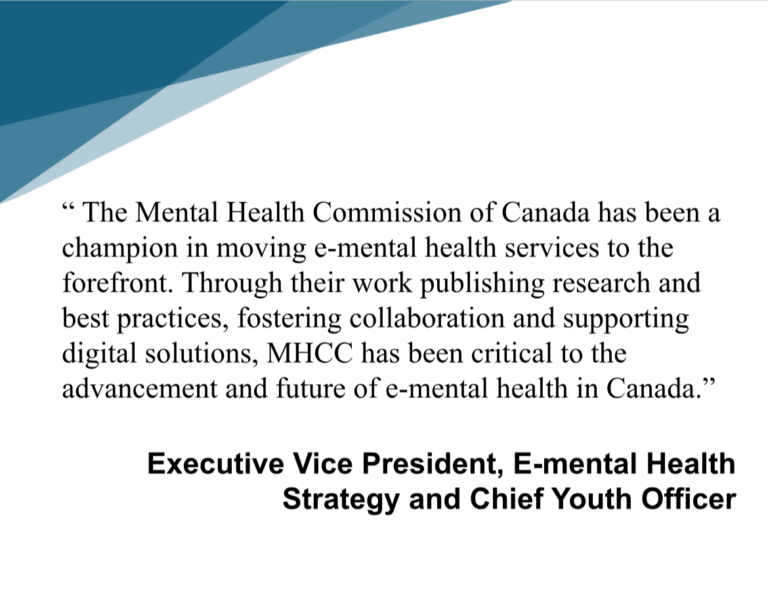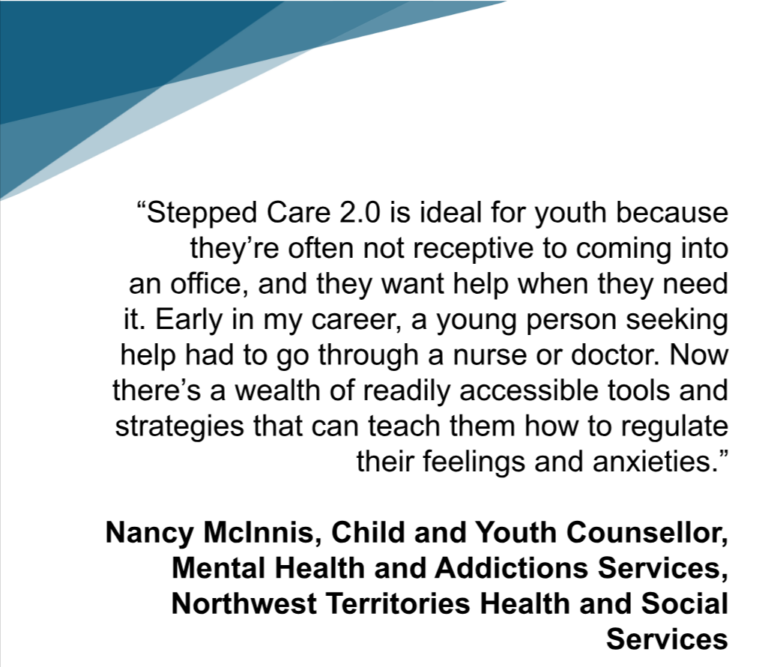Since 2007, the Mental Health Commission of Canada (MHCC) has championed new technologies to improve mental health outcomes. With our bird’s eye view of digital innovation across the country, the MHCC is uniquely placed to identify pockets of excellence and help scale them up.
We play a pivotal role in ensuring that technology is employed responsibly and equitably – to ease mental health wait times, bridge geographic barriers to service, and meet the needs of Canada’s culturally diverse population. In concert, our goal is to establish guardrails that guide the safe development and use of these new digital e-mental health solutions.

Through leading research and program development, and in collaboration with provincial, national and international peers, the MHCC has advanced key initiatives, which have helped boost the uptake and effective implementation of e-mental health. At the same time, we are setting the gold standard for excellence in the field.
The Art of the Possible
In 2012, the MHCC drafted Canada’s seminal plan for sweeping change in mental health service delivery, while signaling much-needed transformation within the broader cultural landscape. Changing Directions, Changing Lives: The Mental Health Strategy for Canada, identified technology as key to achieving all six of its strategic directions.
Harnessing the power of e-mental health to engage people, foster collaboration, and broaden the reach of mental health services was foundational to making much needed progress. The Mental Health Strategy for Canada set the stage for the innovations to come, and the MHCC’s subsequent work brought the tangible possibilities of e-mental health front and centre.
From supporting self-management, to facilitating engagement via peer-support or counselling services, e-mental health is a lynchpin in the present – and future – of mental health service delivery.
A Guiding Light
The MHCC is ideally situated to convene the brightest minds around the table, ensuring that the e-mental health innovations we develop and champion are guided by the latest evidence-based research, best-practices in diversity and inclusion, and are informed by the perspectives of people with lived experience. In 2013, a steering committee was established for this express purpose. It has since regrouped as the E-Mental Health Collaborative.
In 2014, the publication E-Mental Health in Canada: Transforming the Mental Health System Using Technology, laid the groundwork for the actions required to make real and meaningful progress on better integrating, regulating and evaluating the use of e-mental health. From empowering patients through personalized care, to underpinning major system transformation, the brief provided an overview of the challenges and opportunities of wide-scale adoption of e-mental health in Canada.
Key recommendations included the need for a quality assurance framework, which would give both service developers, and users, a yardstick by which to measure safety and effectiveness.
In 2021, the MHCC responded to this recommendation with the development of a national Mental Health App Assessment Framework, finalized in June 2023. This stamp of approval confers credibility on designated apps, signaling they are evidence-informed and adhere to evolving standards.
Before the advent of this Framework, assuring the selection of safe, secure and effective mental health apps was a matter of guess work. The MHCC couldn’t leave something so important to chance. The team is currently implementing the Framework in collaboration with provinces and territories that are building mental health app libraries.
Empowering Patients and Providers
Between 2016 and 2021, the MHCC was extremely busy advancing parallel projects. Doubling down on the power of digital transformation, which research tells us is as effective as face-to-face interventions, the MHCC made a strategic investment in e-mental health, with the creation of a dedicated program.
This initiative yielded a wealth of resources, including key documents such as Mental Health, Technology, and You, Toolkit for E-Mental Health Implementation, and E-Mental Health Case Scenarios and FAQ. A resource co-created by people with lived experience called Mental Health Apps: How to Make an Informed Choice, brings to life the power of e-mental health through a highly relatable illustrated compendium.
In addition to supporting patients, many of whom were keen to access digital offerings, the MHCC also understood the need to equip providers with the capacity and comfort level to integrate digital health into their existing offerings.
Through the revolutionary roll-out of E-Mental Health Implementation Learning Modules, a series of free, self-directed courses, practitioners and allied health professionals were supported to build confidence and competency, bridging the gap from theory to practice.
The development of an e-mental health strategy, set to launch in 2024, is currently underway.
Fostering Partnerships
The MHCC’s collaborations are varied and essential to our progress. Engaging with global partners, such as the Organization for the Review of Care and Health Apps (ORCHA), the MHCC has played a crucial role in shaping international discourse on digital mental health solutions. Further collaborations include our championship and scale-up of Stepped Care 2.0, a model which matches the level, or “step,” of care to the patient’s need, allowing health professionals to work at the top of their scope, and ensuring the most intensive level of care is there for those who require it.
For example, mental health apps, online chat, single sessions and peer-support may be well-suited to those in need of lower-intensity services, which frees up more specialized care at the top “step.” The Stepped Care 2.0 model has been successful at reducing wait times while being highly rated in patient satisfaction surveys. Championing these kinds of innovations is key to unlocking access to quality mental health care.
Voices of Impact
The MHCC is privy to many inspiring stories from those who access e-mental health services. Their experiences underscore the importance of the MHCC’s work in the daily lives of people in Canada.
For those skeptical of the transformative power of digital e-health, look no farther than the story of a young woman whom we’ll call Lisa. Thanks to the MHCC’s Stepped Care 2.0 Demonstration Project in Newfoundland and Labrador, Lisa found the courage to access an online messaging service – the very first time she’d not only acknowledged she needed help, but also asked for it. Because of the Stepped Care 2.0 approach, she was able to strike while the iron was hot, getting immediate support. Finding care at the exact moment you need it is part of what makes Stepped Care 2.0 so special – and effective. This very first tentative step in her recovery journey gave her the confidence to share her struggle with her family, and secure additional supports. By connecting with others who understood her feelings and validated her experience, she understood, “I’m not alone.”

As she got stronger, she turned to apps and e-mental health services to learn game-changing coping skills, and build her self-care toolbox. She credits these interventions with saving her life, affirming they may be lower-intensity, but they are in no way less powerful.
Similarly, at Eating Disorders Nova Scotia, they credit the collaboration and connection around the E-MH Collaborative table for helping strengthen and refine their online environment. By bolstering their virtual presence, they’ve vastly expanded their reach. For this particular group, online peer support may be preferable to being physically present in a room. The sharing of emotions may feel safer in a private space, free from perceived judgment. The uptake of online services has spiked, and the feedback from service users, predominantly young people, has been overwhelmingly positive. Reaching people where they are is a key tenet of e-mental health, and part of what can make it a preferred service choice.
A Vision for the Future
As the MHCC looks to the future, e-mental health remains integral to our work. With the imminent release of Canada’s first e-mental health strategy and ongoing efforts to promote Stepped Care 2.0, the MHCC continues to pave the way for a more inclusive, accessible, and effective mental health care system.
Increasing e-mental health touch points throughout the service delivery system – by scaling up best practices, educating providers and accrediting best-in-class products and services, like mental health apps, are all part of a global shift towards seamlessly integrating digital technologies into the mainstream.
From virtual reality and gaming, to online peer support and big data, technology can help people of all ages, in all places, with all kinds of mental health needs.
Since 2012, when the MHCC formally recognized the important promise of this technology in Changing Directions, Changing Lives, we have made tremendous strides towards progress with the support and engagement of our extraordinary partners.
In September 2024, Ottawa will play host to the 9th Annual Digital Mental Health Congress, co-hosted by the MHCC and eMHIC – a must-attend for anyone seeking to explore technology as a solution to the global mental health crisis.
With over 20 countries in attendance, this extraordinary meeting of the minds brings to life the Strategy’s recommendation to, “…increase the use of tele-mental health and e-mental health by building better infrastructure, providing on-going training and support, and greater flexibility in how services are funded.”





